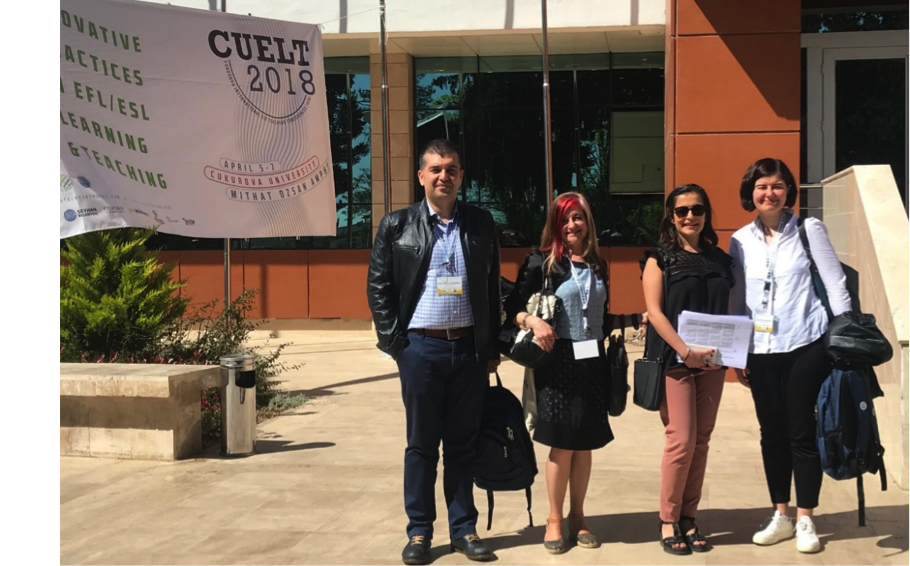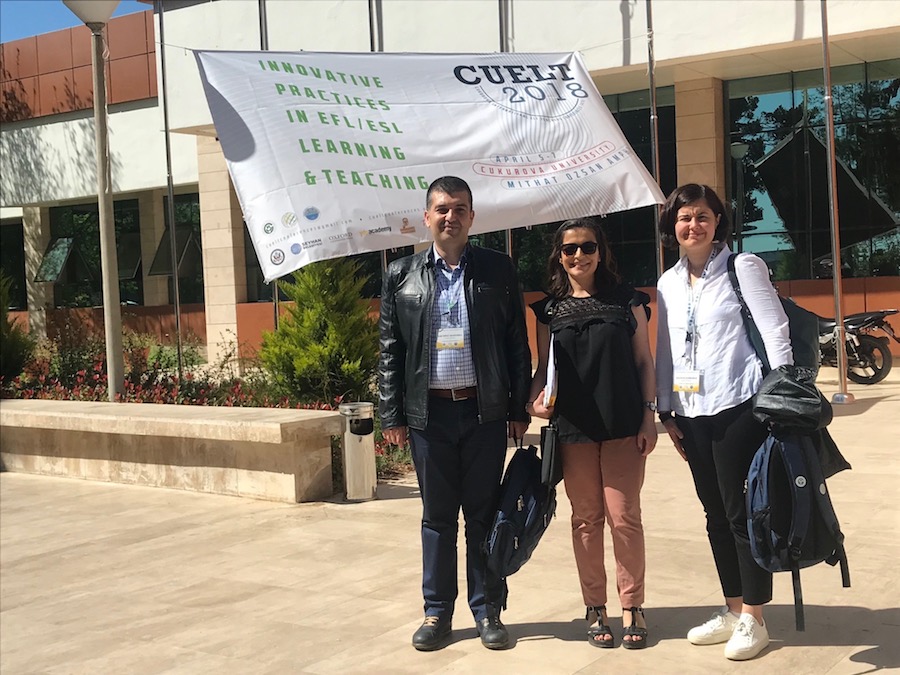4TH CUKUROVA INTERNATIONAL ELT TEACHERS CONFERENCE
4TH CUKUROVA INTERNATIONAL ELT TEACHERS CONFERENCE
Neslihan Demirdirek & B. Sonat Demirdirek & Eda Saraç

We attended CUELT (Çukurova International ELT Teachers Conferences) at Çukurova University on April 5-7 2018. The theme of the conference was ‘Innovative Practices in EFL / ESL Learning & Teaching’. The conference started with the inspirational plenary speaker, Dr. Nur Kurtoğlu Hooton from Aston University. Her session reported on a research project conducted with an international group of 12 English language teachers living and working in 8 countries including Spain, Turkey, Iran, Saudi Arabia, UAE, Vietnam, Hong Kong and Japan. She carried out this research with Anne Burns to offer English language teachers the opportunity to conduct action research locally on the use of new technologies in their teaching contexts. They aimed to investigate the teachers’ experiences of doing practitioner action research, and identify what they had learned as a result both professionally and about the use of technology. They were given British Council ELT Research Project Award.
During the research project, with the participating teachers, they had skype group chats, skype one-to-one chats, a closed-group virtual environment called Pebble+ and a Facebook group. Dr. Hooton presented the processes and practices involved in conducting virtual action research (AR). For each action research project, they followed the following steps:
1.Plan: Identify an issue of interest in your classroom and form a plan to explore it more deeply
2.Act: Put the plan into action in the classroom
3.Observe: Collect evidence about what happens as a result
4.Reflect: Reflect on what is happening and identify further ways to take things forward
(Kemmis & Mc Taggart, 1988)
One of the teachers participating in this project was Okan Bölükbaş from School of Languages, Sabancı University. His project, Using Web 2.0 tools in teaching reading, was carried out with his B2 level students in Sabancı University. His research question was ‘How can I motivate and engage my students in reading classes?’. He used Actively Learn - a web-based tool that enhances reading skills. He prepared his own comprehension, true / false, multiple choice and open-ended questions. In addition, he embedded YouTube videos for different parts of the texts. This tool helped students gain autonomy and receive both peer and teacher feedback online. Although there were positive reactions to studying text in chunks and a dictionary embedded within the tool, there were mixed reactions to reading texts on screen.
Overall, the researchers found that there were many common challenges encountered in language teaching regardless of the location. The participants were all enthusiastic about the opportunities to do research relevant to their own teaching context. However, there were many challenges such as time, resource and course constraints and differing levels of support from students, colleagues and managers in their institutions. Despite these challenges, participants gained a lot professionally. They became more aware of their classroom practices and their students’ learning needs, they increased their knowledge of how to integrate technology into their teaching and there was an enhancement of their research skills. The teacher researchers also had personal gains such as increased motivation, confidence and a sense of empowerment as well as improving their own language. They all considered this process an important professional development activity.
Another inspirational plenary speaker was Dr. Christine Coombe from Dubai Men’s College. Her talk which was entitled ‘Professionalizing Your English Language Teaching’ focused on the characteristics of being a teaching professional. She first reviewed the literature on professionalism and presented definitions of what it means to be a professional and then she presented some myths associated with professionalism as well as the challenges ELT educators face when being a professional. At the end of her talk, she offered some strategies to improve one’s professionalism.
Dr. Coombe started her plenary talk with the following questions:
1.Why do some people tend to find teaching jobs quickly and easily while others appear to struggle in their efforts to find employment?
2.What is the difference between job applicants who all attended the same or similar university training programs and graduated with the same/similar degrees?
3.Why do some people drift from job to job, unable to stay in one place long enough to get tenured?
She said that the difference is simple and explained that those who have succeeded have learned to present themselves as professionals. After giving some definitions of being a professional, she listed some important characteristics. First of all, teaching professionals put student satisfaction first. She went on to list expert and specialized knowledge in teaching, excellent communication skills, high quality work, high standards of professional ethics and having a positive attitude even during tough times. She also added sharing knowledge and expertise and praising peers instead of themselves. Another important characteristic is dedication to professional development. Dr. Coombe listed some adjectives such as being trustworthy, reliable, dedicated, committed and reflective that can be associated with professionals. She underlined the fact that neither teaching experience nor academic qualifications are related to professionalism.
After defining being a professional, she explored the following four myths about professionalism and explained why they are not true in her lively way.
1.Professionals work for big companies/organisations/institutions.
2.Professionals have senior titles.
3.Professionals know everything.
4.Professionals lack manners.
In the last part of her talk, Dr. Coombe shared some strategies for increasing one’s professionalism. First of all, she believes first impressions make a big difference so it is important to know the names of your colleagues and learners. Secondly, you should increase your overall effectiveness by paying attention to time management and organizational skills. She also believes that getting appropriate degrees and qualifications and emulating teachers whom you consider professionals are significant in becoming a professional. Another important point is becoming more self-aware and self-confident. Dr. Coombe gave examples from her own professional life and explained how she achieved her professional goals such as being TESOL president by believing in herself and setting her goals. She also underlined the importance of having effective social skills, communicating effectively with colleagues, managers, students and parents and being a team player. Another important point is following administrative directives even if you do not like them. She said that the rules in an institution are set for a reason and being a professional means following them strictly. Moreover, she highlighted being a lifelong learner and keeping up-to-date in the field. And finally, she recommended having a good life and work balance in order to get rid of stress and continue to work better.
One of the other intriguing concurrent sessions was “Bringing the Award Winning World Cartoons to the Classroom”. In this co-current session, Duygu Ispinar Akcayoglu and Gökçe Dişlen Daggol used the cartoons to be able to elicit ideas, feelings and insights from the students of Translation and Interpreting Department, at Adana Science and Technology University. They used diverse types of eliciting techniques to get the genuine ideas of the students.
Translation and Interpreting students need to create more sophisticated language when compared to other departments’ students. They need to focus more on content and the meaning; therefore, they need to be a little bit more creative while working on the language. Authentic materials can help students to investigate their creativity in that regard. The instructors did not give students just ordinary cartoons, but they actually chose award- winning world cartoons. While dealing with a small amount of material which contains meaningful messages, students were assessed on how they explained and interpreted the message of cartoons. Ten English major students were provided with ten award winning cartoons. The instructors asked them to interpret the message of the cartoons and even go beyond the meaning and description. After that, the mistakes and the flaws of students related to the language were analyzed. The mistakes and flaws were deeply analyzed in accordance with vocabulary, syntax, sentence types, and grammar& structure. I thought that was a really practical and also useful feedback method. I think that type of feedback can also be implemented for certain levels of our Foundation Development Year Students.
The instructors had mentioned that following the feedback session, the students had been interviewed about the particular struggles and difficulties while they were describing the cartoons and conveying the meaning. The study gave away so many interesting results eventually. Those results and consequences provided both instructors and students of Translation Department with various implications regarding the use of authentic materials, students’ choice of vocabulary and tense, and the different methods to handle the issues in verbalizing thoughts in a foreign language.
All in all, The 4th Cukurova International Elt Teachers Conference was really eye-opening and inspirational, as the sessions touched upon different aspects of English Language Teaching. We are looking forward to joining the next one in Adana in 2019.

